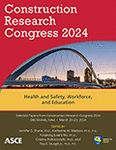Artificial Intelligence and Simulated Virtual Models in Teaching Construction Courses
Publication: Construction Research Congress 2024
ABSTRACT
Artificial intelligence (AI) and simulated virtual models (SVMs) have influenced construction practices by making activities safer, error-free, efficient, cost-effective, high quality, connected, and transparent. With significant advancements, it is anticipated that new courses will be needed to familiarize students with applicable AI and SVMs. A course to introduce AI and SVMs was offered at a state university, but the students requested a more visual and hands-on approach to establish connections between real-world engineering challenges and AI. A ride-on excavator toy was converted into a robot replicating real-world excavator operations of pick-up dirt and dumping at a specific location. In addition, a 3D simulation SVMs was developed for enhancing teaching learning. The use of the robot as a hands-on tool created significant interest in civil engineering and computer engineering students. The learning experience was captured through a structured questionnaire survey, and the analysis shows higher levels of student interest in learning AI applications for construction.
Get full access to this article
View all available purchase options and get full access to this chapter.
REFERENCES
Belfadel, D., Zabinski, M., and Macwan, I. (2021). Introduction to MATLAB programming in fundamentals of engineering course. In 2021 ASEE Virtual Annual Conference Content Access.
Boles, W. W., and Wang, J. (1996). Construction automation and robotics in civil engineering education programs. Journal of Professional Issues in Engineering Education and Practice, 122(1), 12–16.
Carr, B. (2023). Revolutionizing Education: Unleashing the Power of Chat GPT/AI to Empower Educators. Technology and the Curriculum: Summer 2023.
Chen, X., Zou, D., Xie, H., Cheng, G., and Liu, C. (2022). Two Decades of Artificial Intelligence in Education: Contributors, Collaborations, Research Topics, Challenges, and Future Directions. Educational Technology & Society, 25 (1), 28–47.
Chui, M., Manyika, J., and Miremadi, M. (2016). Where Machines Could Replace Humans—And Where They Can’t (Yet). McKinsey.
Fredricks, J. A., and McColskey, W. (2012). The measurement of student engagement: A comparative analysis of various methods and student self-report instruments. In Handbook of research on student engagement (pp. 763–782). Boston, MA: Springer US.
Hamrick, T. R., and Hensel, R. A. (2013). Putting the fun in programming fundamentals-robots make programs tangible. In 2013 ASEE Annual Conference & Exposition (pp. 23–1012).
Luckin, R. (2018). Machine Learning and Human Intelligence: The future of education for the 21st century. ERIC.
McCarver, D., Jessup, L., and Davis, D. (2010). Building entrepreneurship across the university: Cross-campus collaboration between business and engineering. Journal of Small Business & Entrepreneurship, 23(sup1), 761–768.
Mubin, O., Stevens, C. J., Shahid, S., Al Mahmud, A., and Dong, J. J. (2013). A review of the applicability of robots in education. Journal of Technology in Education and Learning, 1(209-0015), 13.
Naser M. Z. (2022). “A Faculty’s Perspective on Infusing Artificial Intelligence into Civil Engineering Education”. ASCE Journal of Civil Engineering Education. https://doi.org/10.1061/(ASCE)EI.2643-9115.0000065.
Criado-Perez, C., Shinkle, G. A., Höllerer, M. A., Sharma, A., Collins, C., Gardner, N., Hank Haeusler, M., and Pan, S. (2022). Digital transformation in the Australian AEC industry: prevailing issues and prospective leadership thinking. Journal of Construction Engineering and Management, 148(1), 05021012.
Sharma, D. K. (2019). Automating Backhoe Operation Using Fuzzy Logic. ISEC PRESS. https://doi.org/10.14455/ISEC.RES.2019.25.
Sharma, D. K., Mahto, R. V., Harper, C., and Alqattan, S. (2020). Role of RFID technologies in transportation projects: a review. International Journal of Technology Intelligence and Planning, 12(4), 349–377.
Wang, R. L., and Zarske, M. S. (2023). Multidisciplinary Engineering Programs: Does Combining Engineering Focus Areas with Courses outside of Traditional Engineering Add Value to Students’ Degree and Career Pathway?. In 2023 ASEE Annual Conference & Exposition.
Woolf, B. P. (2010). Building intelligent interactive tutors: Student-centered strategies for revolutionizing e-learning. Morgan Kaufmann.
Zhang, K., and Aslan, A. B. (2021). AI technologies for education: Recent research & future directions. Computers and Education: Artificial Intelligence, 2, 100025.
Information & Authors
Information
Published In
History
Published online: Mar 18, 2024
ASCE Technical Topics:
- Artificial intelligence and machine learning
- Computer programming
- Computing in civil engineering
- Construction engineering
- Construction management
- Construction methods
- Education
- Engineering education
- Engineering fundamentals
- Errors (statistics)
- Excavation
- Mathematics
- Models (by type)
- Practice and Profession
- Simulation models
- Statistics
- Students
Authors
Metrics & Citations
Metrics
Citations
Download citation
If you have the appropriate software installed, you can download article citation data to the citation manager of your choice. Simply select your manager software from the list below and click Download.
